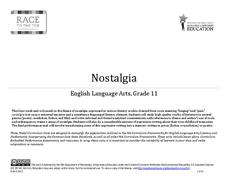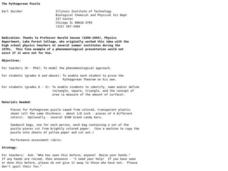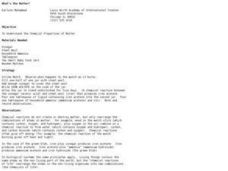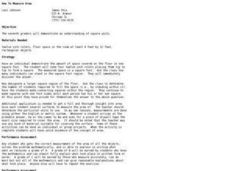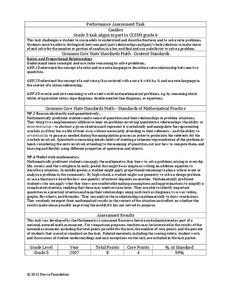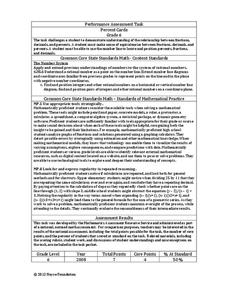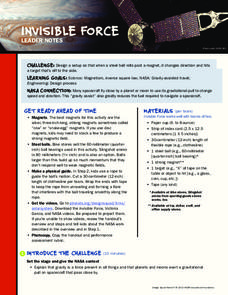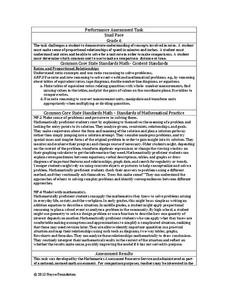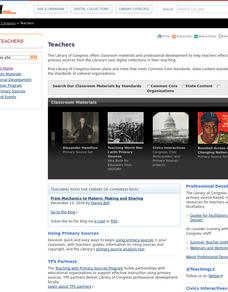Curated OER
Build Your Dream Bedroom
Designers measure their own rooms and produce a scale drawing. They use the Internet to visit sites to find the costs of purchasing new carpet, paint, or anything else they would like to add to their room. Using a $1500 budget, they will...
Curated OER
How Do Artists Effectively Relate Historic Events?
Students explore African American migration. In this black culture and history lesson, students use a map to identify northern and southern states in which African Americans lived in the 1900s. Students observe and describe objects and...
ARKive
Temperate Rainforest in the Pacific Northwest
Explore the amazing temperate rainforest of the Pacific Northwest. Your class starts by investigating the animals and plants of the Northwest, specifically Washington, and then research an animal population common to the area. In small...
Edmond Public Schools
8th Grade Science Resource Book: Unit 2 - Physics
Get things moving with this extensive collection of physical science resources. Covering the fundamentals of measurement, graphing, lab safety, and experimental design as well as the specific scientific concepts of velocity,...
Inside Mathematics
House Prices
Mortgages, payments, and wages correlate with each other. The short assessment presents scatter plots for young mathematicians to interpret. Class members interpret the scatter plots of price versus payment and wage versus payment for...
NASA
What's the Frequency, Roy G. Biv?
While all light travels at the same speed, each color in the visible light spectrum contains a different wavelength and frequency. Scholars determine the relationship between frequency and wavelength as they complete the activity. They...
Massachusetts Department of Education
Nostalgia
To prepare for crafting their own memoir, class members examine poetry by Margaret Atwood, Billy Collins, Robert Hayden, and Claude McKay, stories by Richard Rodriquez and Willa Cather, and Barry Levinson's film Avalon. They examine how...
Curated OER
The Pythagorean Puzzle
An engaging hands-on activity is presented. Learners of all ages are addressed in thie unique plan. K-5 learners identify, name, and define a rectangle, square, triangle, and the concept of area. Older learners prove the Pythagorean...
Curated OER
What's the Matter? (Living and Non-Living Things)
Understand how chemical reactions recombine atoms to create the "chemicals of life". An experiment, showing the basic chemical reactions of an iron nail or a match, helps young children start their understanding of permanent changes.
Curated OER
How To Measure Area
Geometers learn how to measure the area in square units. They use the floor in the classroom as a visual to measure a square foot area. They use classmates to fill the space and expand the measured area square foot by square foot until...
Curated OER
Mean, Median, Mode, etc.
Explore the concept of mean, median, and mode with pupils. They estimate the length of a string or the number of M&M's in a jar. Then find the mean, median, and mode of the class' estimates.
Noyce Foundation
Candy Fractions
While examining fractions and ratios, your leaners get to read about one of their favorite subjects: candy! There are four word problems on this instructional activity. Learners consider situations in which "for every x caramels there...
Noyce Foundation
Rabbit Costumes
How many rabbit costumes can be made? This is the focus question of an activity that requires scholars to use multiplication and division of fractions to solve a real-world problem. They determine the amount of fabric necessary for eight...
Noyce Foundation
Percent Cards
Explore different representations of numbers. Scholars convert between fractions, decimals, and percents, and then use these conversions to plot the values on a horizontal number line.
Noyce Foundation
Baseball Players
Baseball is all about statistics. Pupils solve problems related to mean, median, and range. They calculate the total weight of players given the mean weight, calculate the mean weight of reserve players given the mean weight of the...
Noyce Foundation
Building Blocks
Building blocks have more uses than simply entertaining children. Young mathematicians calculate the volume of a given cube, and then calculate the volume and surface area of a prism formed from multiple cubes.
PBS
Inspector Detector
How do spacecraft detect magnetic fields? The fourth installment of a five-part unit has learners develop a device with magnets that allows for the detection of magnetic fields. They use a map of an imaginary planet to try out their...
PBS
Invisible Force
Investigate invisible forces. Young engineers design a setup that changes the direction of a steel ball using a magnetic force. The purpose of the setup is to model the gravitational pull of spacecraft by planetary bodies.
PBS
Robo Arm
Future engineers create robotic arms like those on rovers built by NASA in the second lesson of the series. They test their devices by attempting to pick up and move cups to a specified location.
Curated OER
Trigonometric Form of Complex Numbers
This lesson is written from the perspective of a student teacher. A step by step lesson in which the class works on the trigonometric form of complex numbers. They convert between trigonometric and complex forms. They will also practice...
Noyce Foundation
Snail Pace
Slow and steady wins the race? In the assessment task, scholars calculate the rates at which different snails travel in order to find the fastest snail. Hopefully, your class will move much more quickly in finishing the task!
Curated OER
The Origin of Life
In this origin of life worksheet, students write answers to five questions. They describe characteristics of the first life forms and how scientists believe oxygen accumulated in the Earth's atmosphere.
Curated OER
Exploring Exponential Growth and Decay Functions
Pupils differentiate between exponential growth and decay. In this algebra lesson, students solve exponential equations using properties of exponents. They use the Ti calculator to graph and analyze their functions.
Curated OER
When Work is Done
Eleventh graders create an album based on a thesis statement about life in the 20th century after completing the introductory lesson for a lesson on the web site "When Work is Done".








